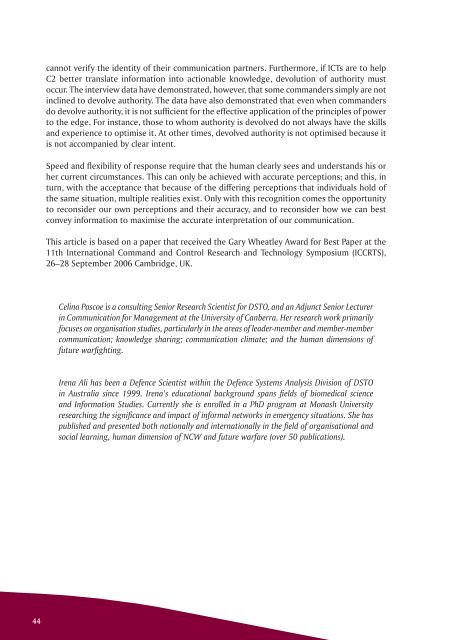ISSUE 176 : Jul/Aug - 2008 - Australian Defence Force Journal
ISSUE 176 : Jul/Aug - 2008 - Australian Defence Force Journal
ISSUE 176 : Jul/Aug - 2008 - Australian Defence Force Journal
Create successful ePaper yourself
Turn your PDF publications into a flip-book with our unique Google optimized e-Paper software.
cannot verify the identity of their communication partners. Furthermore, if ICTs are to help<br />
C2 better translate information into actionable knowledge, devolution of authority must<br />
occur. The interview data have demonstrated, however, that some commanders simply are not<br />
inclined to devolve authority. The data have also demonstrated that even when commanders<br />
do devolve authority, it is not sufficient for the effective application of the principles of power<br />
to the edge. For instance, those to whom authority is devolved do not always have the skills<br />
and experience to optimise it. At other times, devolved authority is not optimised because it<br />
is not accompanied by clear intent.<br />
Speed and flexibility of response require that the human clearly sees and understands his or<br />
her current circumstances. This can only be achieved with accurate perceptions; and this, in<br />
turn, with the acceptance that because of the differing perceptions that individuals hold of<br />
the same situation, multiple realities exist. Only with this recognition comes the opportunity<br />
to reconsider our own perceptions and their accuracy, and to reconsider how we can best<br />
convey information to maximise the accurate interpretation of our communication.<br />
This article is based on a paper that received the Gary Wheatley Award for Best Paper at the<br />
11th International Command and Control Research and Technology Symposium (ICCRTS),<br />
26–28 September 2006 Cambridge, UK.<br />
Celina Pascoe is a consulting Senior Research Scientist for DSTO, and an Adjunct Senior Lecturer<br />
in Communication for Management at the University of Canberra. Her research work primarily<br />
focuses on organisation studies, particularly in the areas of leader-member and member-member<br />
communication; knowledge sharing; communication climate; and the human dimensions of<br />
future warfi ghting.<br />
Irena Ali has been a <strong>Defence</strong> Scientist within the <strong>Defence</strong> Systems Analysis Division of DSTO<br />
in Australia since 1999. Irena’s educational background spans fi elds of biomedical science<br />
and Information Studies. Currently she is enrolled in a PhD program at Monash University<br />
researching the signifi cance and impact of informal networks in emergency situations. She has<br />
published and presented both nationally and internationally in the fi eld of organisational and<br />
social learning, human dimension of NCW and future warfare (over 50 publications).<br />
44

















